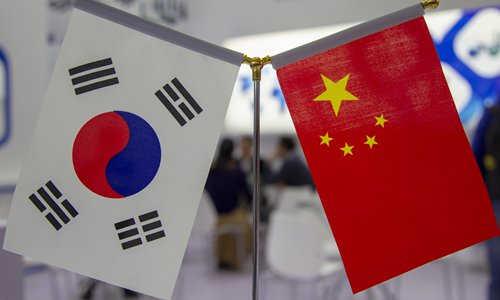China, South Korea cross paths in industry

Photo: VCG
South Korean tech giant Samsung reportedly shut down its last mobile phone factory in China in early October, signaling the chaebol's complete withdrawal from the burgeoning smartphone industry in the world's second-largest economy.
This is an obvious result of industrial competition between China and South Korea, prompting the warning that intensifying competition between the two countries' industries can't be ignored.
Current problems in China-South Korea cooperation are determined by multiple factors in both countries, including domestic politics, economy, security, industrial structure, social trends, historical traditions, and geopolitics. It is these factors that lead to a natural coexistence of cooperation with competition between the two neighbors. There is an increasing overlap between the two economies' paths in industry.
In the early stages of China's industrialization, the two economies complemented each other. But as China builds a complete industrial system and is expanding into high-end industries, competition between the neighbors is unfolding. Meanwhile, contest between South Korean enterprises and foreign companies from Japan, Germany, and the US in China has also heightened.
The situation now is paradoxical. Chinese and South Korean economies are witnessing deeper integration as well as more intense competition. In many domains, fiercer competition is replacing previous complementarity. Such a phenomenon can be observed not only in mid-end manufacturing, but also in the advanced industries. It is foreseeable that competition and cooperation between the two countries will continue to coexist and become the norm for a long time to come.
Trade statistics for the first half of 2019 suggest that such a "normal state" has already impeded China-South Korea trade volume. According to South Korean customs data, imports and exports of goods between the two countries reached $119.83 billion from January to June, down 8.6 percent. But South Korea still had a surplus of $11.64 billion with China.
Among the top three commodities that China and South Korea export to each other, two are the same: mechanical and electrical products, and chemical products. In these two fields, the two countries can to some extent complement each other. In particular, both sides need to import certain raw materials and accessories from the other country to complete the manufacture of their final products.
However, it's worth noting that it is precisely in these industries that competition is growing. This can be demonstrated by the increasing capability of China to produce alternative goods as well as the transfer of South Korean manufacturing and processing industry out of China. Chips, tablet screens and mobile phones are examples.
This has had a direct impact on exports from both economies to third parties. In addition, with the influence of the US-launched trade war against China as well as the ongoing South Korea-Japan trade disputes, an increasing number of Chinese and South Korean products will substitute each other. Furthermore, as the global economy is losing steam and countries are competing for markets, competition between China and South Korea is not likely to reduce in the short term.
Under such circumstances, the development of China-South Korea economic and trade relations will rely on how to expand and enhance cooperation, rather than how to curb or control competition.
In this regard, the two governments have a lot to do. For instance, they can create conditions for enterprises from both sides to cooperate by opening up and expanding services, consumption, and capital markets.
The China-proposed Belt and Road Initiative has provided a huge platform for third-party market cooperation between companies from both sides. Enterprises are able to find plenty of opportunities through improved communication. As competition grows intense, it will be tough for the two governments to control it through administrative or economic measures, which is determined by the market. China and South Korea's economies will see fierce competition in the long run.
Therefore, whether the two economies can find new cooperative approaches, expand areas of cooperation, and tap cooperation potential will have a direct bearing on China-South Korea ties and further economic and trade cooperation in the entire East Asia. This is also an issue that we should pay attention to for improving political and diplomatic ties.
The author is a senior editor with People's Daily, and currently a senior fellow with the Chongyang Institute for Financial Studies at Renmin University of China. dinggang@globaltimes.com.cn. Follow him on Twitter @dinggangchina


